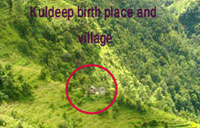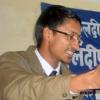थेसीस / Thesis
Tribhuvan University
Kathmandu Model College
Master's Degree Program in English
Thesis Proposal
Name of student : Kuldeep Sunuwar
Roll No : 8
Registration No : 6-1-40-272-96
Year of admission : 2062
Date of submission :
Proposed Title of the Thesis
Struggle over Identity: Colonialist Ideology in Kipling's Kim.
Statement of the Problem
Is Kim white or is he a native? While Kim insists that he is an Indian, the narrator adamantly asserts Kim's British origins. This struggle between Kim and the narrator continues throughout the novel. The struggle over the inheritance is resolved through a bifurcation of the paternal function: on the one hand, Kim's personal and emotional allegiance to the Indians and, on the other, his impersonal and rational relation to the Englishmen. I want to argue that this solution plunges the novel back into colonialist ideology.
Hypothesis
It is hypothesized that Kim is a Manichean allegory, according to which Europeans are rational and intelligent in opposition to the natives who are described as irrational and insufficient. Kim's initiation into Espionage, his becoming an intelligence agent, allows the white Kim to serve colonialist power and the Indian Kim to concert with various natives who are emotional and sensuous.
Review of Literature
Kipling reveals the orphaned son of the Irish soldier called Kim. Kim spends his childhood as a vagabond in Lahore. With an old lama he travels throughout India. The writer creates a vision of harmony of India that unites the secular life and the spiritual life though there is identity crisis on him.
Critic Abdul Jan Mohamed in his essay says," Imperialist is not fixated on specific images or stereotypes of the other but rather on the effective benefits proffered by the Manichean allegory which generates the various stereotypes."(68)
In the same way, he also opines on the attitude of colonialists toward the natives, “Colonialists are willing to examine the specific individual and cultural differences between European values, assumption, and habits in contrast to those of indigenous cultures"(66).
He also asserts allegorical contrast in the comparison of two novels, and says," Kipling's Kim and E.M Foster's The to India, attempts to find syncretic solutions to the Manichean opposition of the colonizer and the colonized."(66)
Similarly, Critic Philip E. Wegner in his essay “Life as He Would Have It" says,” Kipling himself unable to dramatize the 'fundamental conflict' that was the central fact of imperial Indian history."(130)
Culture is the root cause of identity, so Wegner said," the most effective ruler would be those who truly know India. Indeed, one character in Kim emphatically asserts that the good imperial agents are those who know the land and the costumes of the land."(132)
Another critic Gyan Prakash asserts his idea in his essay " Orientalism Now" and says," cultural framework and political discourse distort truth." (203)
He also says, "this criticism is not principally about differing assessment of scholarship of particular individual but about political authority and authoritative discourse. Said's critics concede willingly that cultural prejudice and naked political interest have often marred western studies of other cultures but they regard such biases as matters of mentality."(203)
This dissertation does not observe over these voices, but prolematizes struggle on the identity of the major character Kim which is the main issue of marginalized Indian people. Colonized people's identity is about to ruin because of colonial domination. Kim as an orphan boy, seeks for identity but finally he finds himself as a British Espionage. This is how he plunges into colonialist ideology and colonial society.
Methodology:
The thesis will draw on the theories of Orientalism by Edward Said and Manichean allegory by Abdul Jan Mohamed.
Chapter Division:
This research will be divided in terms of time as well as chapter in the following way:
Chapter I : Introduction Approx. 2 weeks
Chapter II : Discussion of theoretical tools Approx. 4 weeks
Chapter III : Textual Analysis Approx. 5 weeks
Chapter IV : Conclusion Approx. 2 weeks
Works to be cited
Almond, Ian. "Lessons from Kipling and Rao: How to Reappropriate Another Culture." Orbis literarum 57 (2002): 275-287.
Ashcroft, Bill et al. Keyconcepts in Post-Colonial Study. New York: Routledge publisher (date not mentioned).
Bruman, Emily. "Re-dressing Colonial Discourse: Postcolonial theory and the humanist project." Critical Quaterly 40.3 : 79-89.
Carens L, Timothy. "Maping India" Victorian Literature and Culture (2003): 613-623
Dutton ET AL, Michael." The Toolbox of Postcolonialism." Postcolonial Studies 2.2 (1999): 121-124
Feeley, Margarret Peller. "The Kim That Nobody Reads." Studies in the Novel 13.3 (fall81): 266-281.
Greenberger, Allen J. "Rudyard Kipling's India " The Journal of Asian Studies 27.1 (Nov,1967): 166-167.
Gunn, Gills."On Edward W. Said." Raritan23.4: 71-78.
Huggan, Graham."(Not) Reading Orientalism." Reasearch In African Literatures 36.1 (Fall,2005): 125-136.
Jan Mohmed, Abdul R."The Economy of Manichean Allegory: The Function of Racial Difference in Colonialist Literature." Critical Inquiry 12.1 (Autumn,1985): 58-87.
Kaufman, Ester. "Kiplin and the Technique of Action" Nineteenth Century Fictin 6.2 (Sep, 1951): 107-120.
Kipling, Rudyard. Kim .Ed. Beerendra Pandey. Kathmandu. M.K. Publisher,1997.
Kipling, Rudyard. Kim. Ed. Alan Sandison. New Delhi. Oxford University press, 2004.
Matin, A. Michael. "The Hun is at the Gate!: Historicising Kipling's Militaristic Rhetoric,From the imperial Periphery to the National Center." Literary Criticism 31.3 (Fall99): 318-350.
Boehmer, Elleke and Bart Moore -Gilbert. "Postcolonial Studies and Transitional Resistance" Interventions 4.1 (2002): 7-21.
Park, Clara and Claireborne. " The river and the road " The American Scholar 66.1 (winter 97): 43-62.
Prakash, Gyan. "Orientalism now." History & Theory Literary Review 34.3 (1994): 199-214.
Schulze-Engler, Frank. " Exceptionalist Temptatins – Discilinary Constrains: postcolonial Theory and
Criticism." European Journal of English Studies 6.3 (2002): 289-305.
St John, Andrew. "In the year '57' : Historiography, power, and Politics in Kipling's Punjab". The Review of English Studies 51.201 (Feb,2000): 62-79.
Valery, H.L. "Imperialism and Rudyard Kipling" Journal of History of Ideas 14.1 (Jan,1953): 124-135.
Wegner, Philip E. "Life as he would Have It." Cultural Critique 26 (Winter,1993-94): 129-158.
Wollen, Peter. "Kim: The More Things Change the More They Stay the Same". Article 12.1 (May 2002): 157-170.
CURRICULUM VITAE
Name : Kuldeep Sunuwar
Father's Name : Purna Bahadur Sunuwar
Mother's Name : Lila Maya Sunuwar
Date of birth : Mangsir 25, 2035,B.S.(Dec.31, 1978A.D.)
Permanent Address : Khijikati VDC-9, Okhaldhunga
Temporary Address : Dhapakhel VDC-5, Lalitpur
Sex : Male
Nationality : Nepali
Religion : Kirant
Complexion : Black & White
Marital Status : Single
Language Known : Nepali, English, Sunuwari and Hindi
Academic Qualifications
1. Master's Degree in English (Thesis in Progress) from Kathmandu Model College, Kamaladi, Kathmandu in 2007 A.D.
2. B.A. in major English from Tri-Chandra Campus, Ghantaghar, Kathmandu in 2004 A.D.
3. I. A. in major English from Manaviki (Ratna Rajya ) Campus, Exhibition Road, Kathmandu in 1999 A.D.
4. SLC from Tri-Padma Vidyashram, Pulchowk, Lalitpur in 1995 A.D.
Work-Experiences
a. 20/03/1992 to 20/03/2005: Worked as an active volunteer in Sunuwar Welfare Society, Gausala, Kathmandu.
b. 21/03/2005to till now : Working as a Secretary in Sunuwar Welfare Society, Lalitpur District Committee, Tutepani-14, Lalitpur.
c. 05/01/1999-to 04/01/2003: Worked as a Junior English Teacher in Pawan Prakriti English Secondary School, Imadol, Lalitpur.
d. 05/01/2004-to 05/01/2006: Worked as a Senior English Teacher in Pawan Prakriti English Secondary School, Imadol, Lalitpur.
Extra Skills and Trainings
a. Completed Advanced Level English Language from American Language Center, Dhobidhara, Kathmandu. in 2000 A.D.
b. Diploma in Computer from National Institute For Information Technology (NIIT) Kathmandu Center, Jamal, Kathmandu in 2000 A.D.
Interests
Study, Sports, Music and Social Service.
(UN) Unmin Reports
JTMM-G leader killed
Rautahat, July 27
A group of YCL cadres shot dead the area No 5 Commander of Janatantrik Terai Mukti Morcha (Goit) Binod Mukhia after abducting him on Thursday night.
According to Morcha's Military Commander Abhaya, Mukhia'Bin' was abducted from his home Rauthat District's Sitalpur Baginiya-8.Abhaya claimed that activists took Mukhia to Bhasedawa Village and shot him dead.
JTMM-G marks anniversary
Bara, July 27
Janatantrik Terai Mukti Morcha –Goit cadres staged a rally on Friday, and fired shots in air on the occasion of fourth anniversary of their party's establishment around Bhagwanpur, paterwa, Pipradi, Banauli and Kalaiya.
Flood continue to ravage Terai
Kathmandu, July 27
Incessant rainfall and floods continued to ravage districts of the Terai region's districts like Sunsari, Morang, Saptari, Siraha, Bara, Rautahat, Nawalparasi, Banke and Bardiaya.
Banke- 1,575 families hit
153 families displace
Nepalganj- 101 houses collapse
Bardiya- 40 houses collapse
Sunsari- 155 houses swept away, 200 houses displace
Sankhuwasava- 3 houses collapse, 15 families displace
Dolakha-1 primary school collapse, 10 houses collapse
Bara- 98 VDC and 1 municipality affected
Rautahat- 300 temporary houses collapse, 30 families displace, 200 houses collapse
Sarlahi- 142 houses flooded, 161 houses collapse
61 houses hit including police post in Balara VDC-2 by Bagmati River.
Prepared by: Kuldeep Sunuwar









